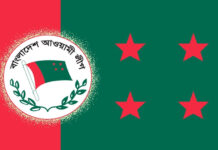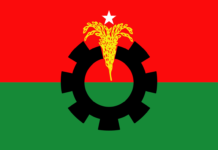Sadeq Khan
Prime Minister Sheikh Hasina told parliament on March 11: “The moment the arrest warrant and search warrant will reach Gulshan Police Station, steps will be taken to arrest her and search her office. “This is just a matter of time. The day is not far away.”
To the general public, who are getting used to the verbal and physical war of attrition being carried on between the 14-party alliance’s police raj with a power-sharing loyal opposition of Jatiyo Party as its side show on the one hand and the 20-party alliance’s 2-month old continuous petrol bomb-throwing transport blockade on the other, that threat is being taken with a pinch of salt as a rhetoric of psychological warfare.
The 20-party alliance, with its leader Khaleda Zia virtually captive in her office since January 3 and other leaders mostly in hiding or in jail, has let it be known to the press that it is preparing for elevating its blockade and intermittent hartal programme to its next phase of “non-cooperation” in the revenue sector towards a culmination of siege around the Prime Minister’s office.
Abhijit’s murder & weak rule of law
Rhetoric’s on both sides notwithstanding, stalemate continues as drastic police measures including fake encounters, gunshot-maiming of suspects at random and massive arrests are failing to contain hit and run counter-attacks by faceless young harbingers of countrywide discontent and disorder. Commenting on the murder of “the author and blogger” Avijit Roy, “an avowed atheist and an American citizen”, The New York Times opined tried bloggers for blasphemy under Section 57 of the country’s 2006 Information and Communication Technology Act, which bars disseminating any information that causes to hurt or may hurt religious belief or instigate against any person or organization. Political polarization between Mrs. Hasina’s Awami League government and the Bangladesh National Party’s leader, Khaleda Zia, is also contributing to the crisis. Alarmed, the United Nations has called for dialogue between the opposing parties.”
The Indian newspaper The Hindustan Times of New Delhi observed in a commentary on 2 March: “If the beheadings that ISIS specialises in and the chilling efficiency of the attack on the editors of Charlie Hebdo weren’t gruesome enough, Islamic extremists in Bangladesh used meat cleavers to hack to death the Bangladeshi-American atheist blogger Avijit Roy in public view in Dhaka as the writer was returning from a book fair along with his wife on February 26. The attack in Dhaka points to disturbing trends both in Bangladesh and further afield.
“Bangladeshi civil society activists have bravely staged protests in Dhaka following Mr. Roy’s death but extremists will test their resolve in the future.
Such challenges can only be tackled with credible State capacity, which Bangladesh seems to have little of at the moment. That the extremists could openly threaten Mr. Roy and murder him in the capital points to Bangladesh’s broken politics and the weak rule of law it has wrought.
“Last standing opposition”
“The country has seen so much chaos that it is difficult to discern which systems actually work on a daily basis. Its politics are split by an unrelenting contest between the Awami League, led by Prime Minister Sheikh Hasina, and Khaleda Zia’s BNP, which has the support of Islamist parties. The country is divided by religious-secular disputes that originate in Bangladesh’s violent passage to independence in 1971.
“The BNP’s call for a nationwide transport blockade in an effort to force Hasina from power has resulted in widespread violence killing more than 70 people. Ms Hasina has to take her share of the blame for the deteriorating situation. She has strong secular credentials but is showing authoritarian tendencies under pressure. (Ms Hasina must) take political risks to stop her country’s slide into further chaos.”
Commenting on the political conflict in Bangladesh in a “discussion” of International Peace and Conflict Studies, former Indian ambassador to Bangladesh Pinak Ranjan Chakravarty noted: Over the years, the Bangladeshi army has become a more professional force and is no longer a Pakistan-trained army. It is likely that the army might not intervene unless there is total breakdown and chaos. This is what the BNP’s goal seems to be – to get the army to intervene and maybe bring a caretaker system.”
The Economist of London in its commentary on politics in Bangladesh dated 5 March under the title “On the Boil” observed: “The endgame may have started, but this week it became clear that it will take its time to play out. On February 25th a warrant was issued for the arrest of Khaleda Zia, the leader of the opposition Bangladesh Nationalist Party (BNP); many people had expected police to haul her in this week. Mrs. Zia is not only the archenemy of the prime minister Sheikh Hasina; she is also virtually her government’s last standing opponent.
Hasina in two minds
“Over the past two months, as the confrontation between the two rivals has reached a fever pitch, people have stopped asking whether Sheikh Hasina would find a way to imprison Mrs. Zia; now they are only asking when. On March 4th, a court gave the answer: not yet. It postponed hearings in her case for a month.
“Mrs Zia’s reprieve might have more to do with politics than judicial considerations. Rumour was that she would be arrested on March 4th. Then, just the evening before, diplomats from nine countries including America, the European Union, Australia, Japan and Turkey paid a surprise call to her office, which is also her last redoubt. Police have kept her barricaded inside for the past two months. The diplomats’ visit perhaps brought home to the government that if it were to be seen unjustly imprisoning a rather frail 69-year-old lady, it might in effect be helping Mrs. Zia pose as an emblem of democratic virtue.
“In her state of informal detention, and now with a life sentence hanging over her head, Mrs. Zia is nonetheless the opposition’s only significant figure who is not yet behind bars. In recent months most of its other leaders have been put in jail, under house arrest or into exile. On February 25th police detained Mahmudur Rahman Manna, a politician who had sought to form a new political party. Tens of thousands of activists have been arrested. And a war-crimes court has sentenced to death the main leaders of the BNP’s closest electoral ally, the Jamaat-e-Islami, the country’s third-largest political party. Meanwhile more than 120 people have died on the streets since January 5th, most killed by firebombs thrown by the opposition and many shot by police. Conditions are hardly amenable for any future organisation of credible elections.
Space being vacated for extremists
“Space is being vacated for extremists, notably religious fanatics, who pose a growing threat. A reminder of that came on February 26th when an American-Bangladeshi writer was dragged from a rickshaw in Dhaka and hacked to death on the street. He had dared to criticise Islamist extremists online; in turn they had vowed to kill him. It is unclear whether there is any peaceable way out.
“In the meantime, the economy continues to suffer. Street protests are preventing some of the massive garment industry’s production from reaching the market, which is in turn reducing the volume of orders, all to the dismay of business leaders and the rest of Dhaka’s elite. Some of them think another kind of change might be imminent. If the army, Bangladesh’s third political force, grows impatient over the appalling behaviour of the civilian politicians and turfs them all out, it would not be the first time.
“The country’s more important foreign partners America, India and Saudi Arabia, for example will not be pleased by the prospect of democracy in Bangladesh collapsing outright, yet again. India’s prime minister, Narendra Modi, is expected to visit soon; … but he would also like to see Bangladeshi politics looking as stable, and moderate, as possible.”
The Indian Prime Minister, out on tour of Indian Ocean island states including Sri Lanka, has not yet confirmed any date for his Dhaka visit. The Chinese Prime Minister is not coming either for his scheduled visit, and is sending his deputy instead. Nor is John Kerry, the US Secretary of State, confirming any date for his visit solicited by Dhaka. Is the endgame really near?
Source: Weekly Holiday









